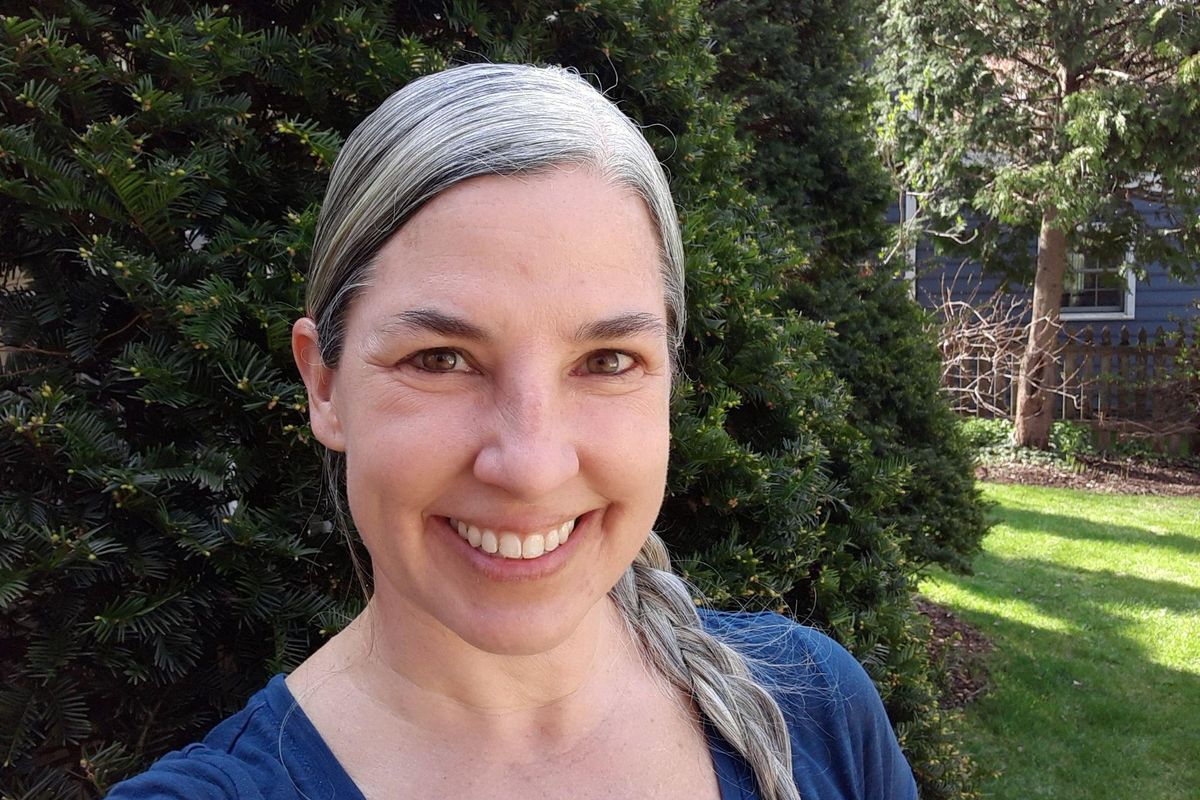As told to Alex Fulton
The call came after lunch. It was November, just before my 47th birthday. That morning, I'd gone for a transvaginal ultrasound, as I'd done every six months since becoming aware of my BRCA1 mutation 10 years earlier.
The BRCA1 mutation greatly increases breast cancer and ovarian cancer risk, so doctors had recommended I remove my ovaries by age 40. But I hadn't wanted preventive surgery, so instead I went in every six months for ultrasounds and waited tensely after each one, wondering how I'd handle the news if it was bad. Then I finally got the call. They'd found a mass on my ovary.
The only way to know if this growth was cancerous was to have surgery. I spent the holidays with my family trying to hold each moment, knowing it could be our last visit before I became a cancer patient.
I met the surgeon armed with questions. I had to evaluate options around keeping my uterus and cervix, and I had to choose quickly. Either way, the surgery was deemed easy and routine. But, none of it felt remotely easy to me — it was the scariest event of my life.
With the pros and cons appearing about even, I chose to have a hysterectomy and bilateral oophorectomy (removal of the uterus and both ovaries). That meant I'd be thrown into instant, early menopause.
Instant surgical menopause creates risk of long-term consequences throughout the body, whether outward symptoms are felt or not. Bone fractures, cardiovascular events and dementia all become more likely with the complete and sudden removal of hormones. It's quite different from natural menopause, which is gradual and leaves some residual hormones in the body.
Prescription hormones can fill the gap, and they seemed essential to me. I asked if I could start hormone replacement therapy (HRT) right away. The surgeon mentioned some concerns about HRT and possible related health risks.
Nevertheless, I pushed to leave the hospital with HRT in hand to protect my future health. But when it was time to take the first pill, I froze. If the doctor didn't bring it up, maybe I didn't need it. I had worked in the wellness industry for years and had heard messages telling me I should handle menopause naturally. So I doubted and waited while my surgical wounds healed and the onslaught of symptoms began.
From head to toe, the effects were startling. My thoughts were fuzzy, my mood was flat. I couldn't sleep and my vision changed. My joints ached and the hot flashes and night sweats scrambled my brain and drenched my clothes.
Once I healed enough to try having sex again, I found I had no libido and completely dry vaginal tissue. I was told it would take six weeks post-op for sex to be "normal" again, but it took six months to even approximate normal — and sex will never be the same.
Fortunately, I got a clear pathology report, which eliminated the fear of ovarian cancer. But I grieved for the loss of my fertility, femininity and sense of control over my mind and body. I was overwhelmed by the fear of the invisible aging processes happening inside me, and my confidence plummeted.
After suffering for a few months, I made a list of my symptoms and sought out a menopause specialist, hoping to get personalized guidance. She offered me nothing more than a recommendation to start HRT. I was furious that she, the expert, could not help me find answers.
Still, that day I went home and popped the first HRT pill. It helped lessen many of my symptoms within a week. I wish I hadn't second guessed myself about starting hormones right away.
Just like menstruation, we don't talk enough about menopause. I think what happens is that the feedback loop of silence means symptoms aren't reported to doctors, who then have no idea what women are actually going through. Natural menopause and surgical menopause are sometimes conflated, and I believe doctors may shy away from HRT due to an overemphasis on hypothetical dangers rather than lifetime benefits.
Women like me often enter surgical menopause with an urgent surgery and no time to prepare. This leaves us scrambling for information once we're already in its throes. I believe surgical menopause should come with automatic counseling, especially to address the identity shake-up that comes with loss of reproductive organs.
Thankfully, I've found online groups of women telling their stories of surgical menopause where I can share my concerns and experience. Even though I've had to find them on my own, the resources are abundant. In sharing my story, I hope to be a resource, too.
With my partner, we're slowly addressing the sexual side effects with dialogue, patience and lots of lube. We're getting used to my new body and affectionately poke at the fading scars on my numb belly, hoping the sensation will return. We've lost some spontaneity, but our intimacy continues to grow.
After a challenging year, I've begun to tiptoe toward accepting my body and its new shape instead of dwelling on what's changed. My experience has both forced and allowed me to speak more freely than ever about my sexuality, my body image, my relationships and my sense of self.
I've found more personal honesty than ever before, and I know I'm capable of enduring so much.
- Talking about menopause - HealthyWomen ›
- How Does a Hysterectomy Affect Menopause? - HealthyWomen ›
- Hysterectomy - HealthyWomen ›
- How Surgery Threw Me Into Abrupt and Complete Menopause ... ›
- Hysterectomy and Lack of Sexual Urge - HealthyWomen ›
- An Experience with Surgical Menopause - Induced Menopause - HealthyWomen ›







